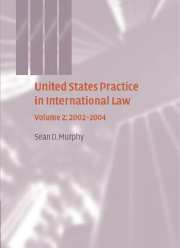Book contents
- Frontmatter
- Contents
- Foreword by Judge Stephen M. Schwebel
- Acknowledgments
- Table of Periodical Abbreviations
- Table of Cases
- Table of U.S. Statutes
- Table of Treaties
- I General International and U.S. Foreign Relations Law
- II State Diplomatic and Consular Relations
- III State Jurisdiction and Immunities
- IV State Responsibility and Liability
- V International Organizations
- VI International Oceans, Environment, Health, and Aviation Law
- VII International Economic Law
- VIII International Human Rights
- IX International Criminal Law
- X Use of Force and Arms Control
- XI Settlement of Disputes
- XII Private International Law
- Annex
- Index
Foreword by Judge Stephen M. Schwebel
Published online by Cambridge University Press: 10 December 2009
- Frontmatter
- Contents
- Foreword by Judge Stephen M. Schwebel
- Acknowledgments
- Table of Periodical Abbreviations
- Table of Cases
- Table of U.S. Statutes
- Table of Treaties
- I General International and U.S. Foreign Relations Law
- II State Diplomatic and Consular Relations
- III State Jurisdiction and Immunities
- IV State Responsibility and Liability
- V International Organizations
- VI International Oceans, Environment, Health, and Aviation Law
- VII International Economic Law
- VIII International Human Rights
- IX International Criminal Law
- X Use of Force and Arms Control
- XI Settlement of Disputes
- XII Private International Law
- Annex
- Index
Summary
It is not unusual in the most elevated circles of international law to hear envious grumblings about the exceptional influence on the development of customary international law of the United Kingdom and the United States. It is a fact that they have had and do have extraordinary influence in the fashioning of international law. That fact flows first of all from the power that the British Empire and the United States of America have exerted internationally for more than two hundred years. Elements of that power have been the international trade that their economies have promoted and the naval might that their governments have projected. Their influence derives as well from the nature of the British and American democratic polities, based as they are on law. Still another significant factor is that the academic and scholarly contributions of British and American international lawyers to the development of international law are unsurpassed.
But still another element of the influence of these great English-speaking States on the content of customary international law is that their practice is published. For the practice of States to influence the development of international law, that practice must be known. “International custom, as evidence of a general practice accepted as law,” is generated not only by the actuality of that practice but by the dissemination of the evidence. In the publication of their practice, the United States and the United Kingdom have long been in the lead.
- Type
- Chapter
- Information
- Publisher: Cambridge University PressPrint publication year: 2006



